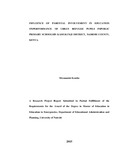| dc.description.abstract | The purpose of this study was to investigate the influence of parental involvement in education on performance of urban refugee pupils in public primary schools in Kamukunji District, Nairobi County, Kenya. More specifically, the study sought to examine the extent to which parental care contributed to performance of urban refugee pupils in public primary schools; examine how parents’ education levels affected performance of urban refugee pupils in public primary schools; establish the degree to which parents ability to meet educational costs affected performance of urban refugee pupils in public primary schools; determine how parents’ communication with the school affected performance of urban refugee pupils in public primary schools; and examine how parental participation in school activities affected performance of urban refugee pupils in public primary schools.Parental involvement in their children’s education has been shown to contribute to better academic scores. Research has clearly linked parent involvement to positive educational out comes; including more positive attitudes towards school, better grades, and higher test scores. The researcher used descriptive survey design to collect data and targeted a population of 3032 respondents drawn from six public primary schools, 308 respondents were used in this study and included the head teachers, teachers, pupils and the parents. The researcher used cluster and purposive sampling techniques to determine the population to be included in the study. The tools used to collect data included the questionnaire as well as the interview schedule. The questionnaires were used on the head teachers, teachers, and pupils, whereas the interviews were administered to the parents. Quantitative data was analyzed through descriptive statistics and the results presented in the form of tables, percentages and frequencies to allow for data interpretation. Qualitative data on the other hand was analyzed through content analysis. The study has revealed that most parents take care of their children even under difficult circumstances, 44.3% of the refugee parents are preliterate and don’t get involved in their children’s education due to ignorance,64% of refugee parents are unable to meet educational,83.3% of the refugee parents communicate with the school to find out the progress of their children and 76% of the parents participate in school activities such as attending meetings and clinic days. Based on the findings of the study, it is recommended that, the UN and other refugee agencies assist refugee parents with livelihood activities that enables them to care and cater for their families comfortably, NGO’s set up adult learning centers near refugee residential areas which offer language and entrepreneurial skills for free, the Government of Kenya increases education budget to allow for absolutely free basic education for all its citizens including the refugees, school administration encourage a two way communication through frequent forums that parents can participate and initiating programs where teachers can visit pupils’ homes and lastly schools actively seek to share and learn from inclusive practices developed by others. | en_US |

